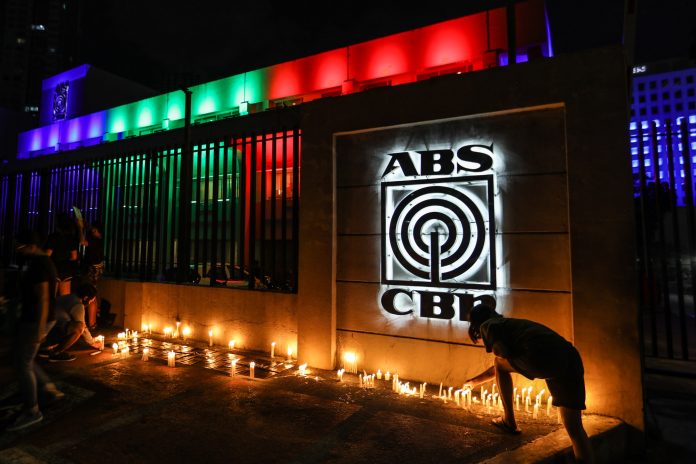Philippines’ broadcast giant ABS-CBN has earned praise and accolades, and the anger of a series of national leaders since 1986, the year it went back on air following two decades of silence under Ferdinand Marcos’ rule.
Only President Rodrigo Duterte has made good on threats of closure.
After promising to issue the broadcast network a provisional permit while Congress works on pending bills for renewal of its lapsed franchise, the National Telecommunications Commission handed down a closure order.
As the network’s flagship newscast, TV Patrol, neared its final seconds on May 5, anchor Noli de Castro said the words in the hearts of the company’s 11,000 workers: “We will not be silenced despite this attack on our democracy and press freedom.”
“In the face of this challenge facing our company and livelihood, we will not turn our backs on you,” he promised the audience, including a major portion of 10 million Filipinos living and working abroad.
On the sidelines, journalists used to training cameras and microphones at other people, filmed each other.
There were tears but also plenty of expressions defiance: whoops and hand-clapping, raised fists and shouts of “fight!”

Thousands of jobs on the line
Reporters continued to work the day after ABS-CBN Channel 2’s screen went black and static replaced the voices of its anchors.
At 2 a.m. on May 6, Jervis Manahan was tweeting live coverage of thousands of residents of Quezon City waiting overnight for the cash aid Duterte promised.
The closure of ABS-CBN did not affect the network’s cable and digital platforms, with a combined audience of 78 million accounts.
Carlo Katigbak, ABS-CBN chief executive officer, has promised salaries will continue for the next three months. But the loss of the publicly-listed network’s free-broadcast profit centers could force drastic workforce trimming.
Investment analysts opine that even leadership in the digital space could not offset revenue losses from a halt to legacy media operations already hampered with the closure of entertainment programs because of the COVID-19 lockdown.
“In these trying times, information save lives. You don’t kill the people and the platform delivering valuable life-saving information,” said Senator Nancy Binay, whose father, former vice president Jejomar Binay also experienced the sting of the network’s critical coverage.
Mailed fist
True to its passive-aggressive nature, President Duterte’s office washed its hands of the outrage that sparked a global Twitter trend with more than 1.1 million angry messages.
The crocodile tears and platitudes for a quarter of a century of service since the return of democracy, cannot mask the truth.
The president has gone out of his way to repeatedly hurl verbal abuse and all kinds of charges at the broadcast network.
The president’s gripes seem laughable: election advertising, paid for, that the station’s Davao branch did not air; and alleged bias in election coverage.
Both charges are untrue. The network tried to return the money for unaired ads, but Duterte refused to accept the money. The former mayor of the southern Philippines city of Davao also got plenty of press, good and bad, during the campaign period.
But Duterte, so used to slavish coverage and the kind of kowtowing reserved for warlords, has a yen for ignoring facts coupled with a dangerous penchant for “weaponizing the law” against perceived enemies.
Solicitor-General Jose Calida targeted ABS-CBN for a repeat of his successful “quo warranto” move against former Chief Justice Lourdes Sereno.
On May 3, World Press Freedom Day, Calida threatened the National Telecommunications Commission with criminal cases if it issued the broadcast giant provisional permit.
And so 48 years after Marcos closed down ABS-CBN, together with all other media outlets in the country, darkness has fallen again for the network.
Duterte’s hostility toward a critical press extends far beyond ABS-CBN.
He launched attacks on Philippine media even before assuming office in 2016, to the point of justifying the killings of journalists.
The editors of digital news portal, Rappler, face half a dozen criminal cases and the possible closure of their outfit. They are also banned from covering the presidential palace.
Routinely, reporters covering human rights violations in the provinces are tagged as terrorists. At least two reporters of an alternative media outfit are in jail.
Journalists also continue to die in the Philippines.
As ABS-CBN ended its newscast on the evening of May 5, still unidentified gunmen shot dead radio broadcaster Rex Cornelio, the third journalist killed in Dumaguete City in as many years, and the 16th slain under Duterte’s term.
Crippling the network giant isn’t just an act of war on one corporate entity. It is an attack on press freedom and the people’s right to access free, independent information.
In some areas, including the war-torn city of Marawi, radio and television signals can only get ABS-CBN’s channels.
The network’s fighting journalists have pledged to continue shining their light on many problematic aspects of governance, as well as the good news. They are joined by millions of angry Filipinos on social media.
Our people have triumphed over tyranny before. They will defeat Duterte.
Inday Espina-Varona is an award-winning journalist in the Philippines. She is a recipient of the “Prize for Independence” of the Reporters Without Borders in 2018. The views expressed in this article are the opinions of the author and do not necessarily reflect the editorial stance of LiCAS.news.









